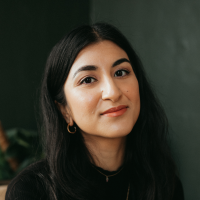
I approach editing the same way I do curating an issue: I hope to create a conversation. I sometimes fear that poets think they must accept all my proposed edits—that if they do not, I will yank away a line from their CV. I want poets to know that they have power as writers, and the relationship between editor and writer is one of equal status.
Editing is an open dialogue: I suggest a line break or title change because I am rooting, deeply, for your work. I want it to be understood and seen. Feedback is a form of love, and it is through love that we strive to make things into the best versions of themselves.
My goal as an editor is to understand your intentions, and as such, I want the writer to understand mine. If you’re unsure why an editor is suggesting a change, do not be afraid to ask! I hope that you are open to change, and that you trust that I have the best wishes for your poem at heart. You are also allowed to defend your choices—in fact, I hope that by doing so, I learn something from your poetics.
I want writers to consider their submission processes as ways to be in community. After all, an issue of a literary magazine is a small community—the poems within a cohesive issue are meant to speak to one another. Let us do what our poems do: Speak to each other, grow from each other, consider our words in larger contexts. My advice on how to do this: Submit to literary magazines helmed by writers you want to be in community with. Send your poems to homes that will treasure them and, by extension, will treasure you as a writer.
—Saba Keramati, poetry editor of Sundog
Photo credit: Marissa Kimmel






